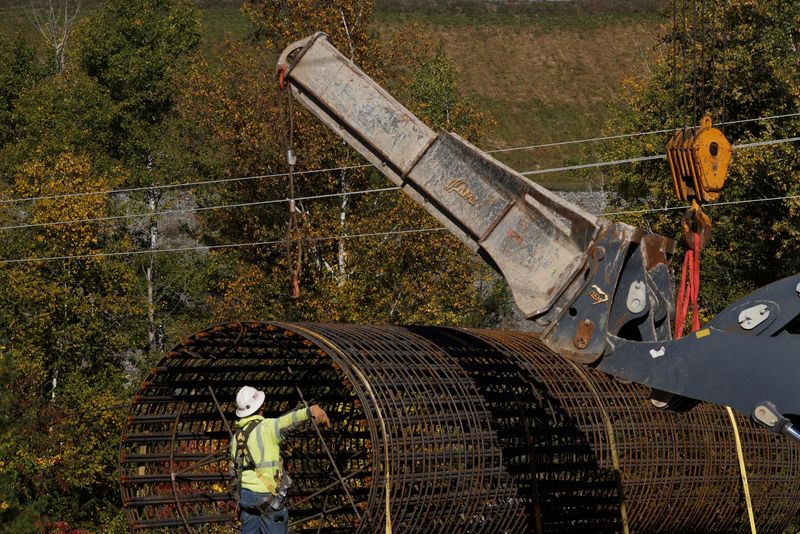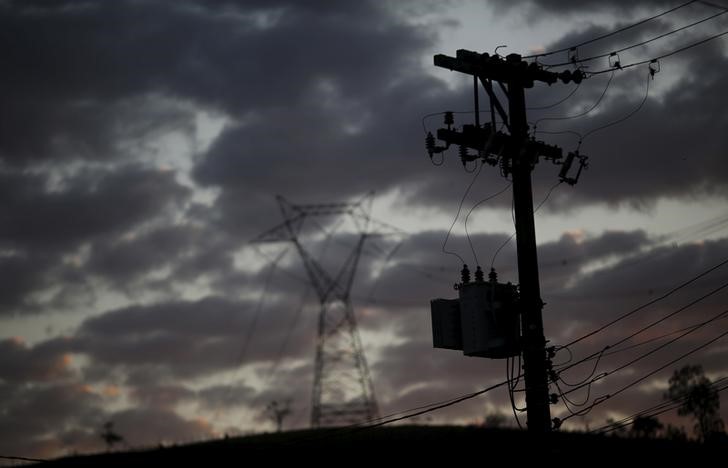By Richard Valdmanis and Nichola Groom
BINGHAM, Maine (Reuters) - Evelyn and Bruce Beane love the wild country that surrounds them in this tiny town on the Kennebec River, skirted by miles of mountains and forested by birch, maple and pine.
So when developers arrived here a few years ago asking their support for a power transmission project that would cut through nearby woods to bring Canadian hydropower into New England, they said no.
“This is where people come to get away from power lines,” said Evelyn, 65, standing on the porch of the couple’s home as logging trucks, pickups, and hunters on ATVs passed along the road. “We don’t want it to turn into everywhere else.”
The Beanes were among the more than 230,000 Mainers who voted to reject the 145-mile (233 km) New England Clean Energy Connect (NECEC) project in a referendum this week, bringing an apparent end to a years-long battle over the 1,200-megawatt line that had pitted clean energy advocates against locals seeking to preserve the state’s woodlands.
The fate of the project – billed by its proponents as part of the solution to climate change https://www.reuters.com/business/cop - reflects the difficulty faced by developers nationwide in siting new transmission lines, many more of which must be built to modernize creaking grid systems and connect far-flung renewable energy sources.
No one seems to want the projects to be sited anywhere near them.
“If this type of project can’t get through, good luck getting others through,” Dennis Arriola, CEO of energy services and delivery company Avangrid (NYSE:AGR) Inc, which controls the project, said in an interview earlier this year.
That is a problem for the administration of U.S. President Joe Biden, which has made modernizing the nation’s electric transmission systems a key element of its plan to decarbonize the U.S. power sector by 2035. It has earmarked billions of dollars for the effort in its White House infrastructure package being debated by Congress.
Lots more money may be needed. Consultancy Marsh & McLennan has estimated more than 140,000 miles of transmission lines must be installed in the next three decades to meet the nation’s energy needs, at a cost of about $700 billion.
But of the roughly 20 high-voltage transmission projects now in development across the country, several face siting challenges. The $3 billion TransWest Express line to deliver wind power from Wyoming to Las Vegas, for example, is hung up in court after a land owner along its route obtained a federal conservation easement that could block its construction.
U.S. Energy Secretary Jennifer Granholm said the Biden administration is aware of the siting issues for transmission projects and is looking at ways the federal government can get involved. “There are an awful lot of lines that have been permitted and that just need that extra push to get over the finish line,” she told reporters on a conference call from the global climate conference in Glasgow.
The Maine transmission corridor was first proposed in 2017 after a previous proposal through New Hampshire was blocked by local opposition. Avangrid has already spent $400 million clearing land and installing poles for the Maine project after securing federal and state permits.
Avangrid said it would keep fighting for the project despite the election outcome, and swiftly filed a lawsuit in a Maine court on Wednesday.
'THIS ISN'T THE WAY'
Bingham’s cluster of worn-out wooden homes, gas stations and wilderness outfitters has been a center of opposition to the NECEC project for months, with many of the buildings posting signs opposing it in their yards. One house hung plywood boards carrying messages in spray paint: “Stop FOREIGN INTRUSION on AMERICAN SOIL,” and “Nothing clean about NECEC.”
The homegrown feel of the opposition belies the fact that corporate interests on both sides spent tens of millions of dollars on their campaigns, making it the most expensive referendum battle in Maine history. U.S. power company NextEra Energy Inc (NYSE:NEE), which has competing generating projects in New England, was among the big spenders seeking to sink the project.
Even so, local sentiment runs deep.
Joe Dionne, 71, worked in the local lumber industry for 31 years and now works in real estate. He said he opposed the project because he believed it would leave a permanent scar in the landscape, harming his business and discouraging wilderness tourism.
“They’re just going to flatten that land,” Dionne said. “It doesn’t benefit us at all."
Asked about whether such projects are needed to fight climate change, Dionne said: “Climate change is a load of B.S.”
The Beanes believe in climate change, but still have reasons to oppose the transmission project.

Evelyn, a registered nurse, said the region has been a peaceful retreat from her hectic younger life in New York City. And for Bruce, 70, a retired construction worker, the untouched landscape is a living link to his ancestors who arrived here before the American Revolution.
“We know green is important. But this isn’t the way,” said Evelyn.
